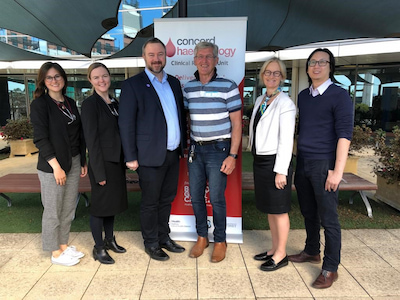Study examines COVID-19 vaccine response in low-grade lymphoma
An Australian study will examine the immune response to the COVID-19 vaccine in patients with the low-grade non-Hodgkin lymphomas – follicular lymphoma and Waldenström’s Macroglobulinaemia.
The COVAX-lymphoma study is about to open in Sydney at the Concord Repatriation General Hospital in collaboration with the Kirby Institute, St Vincent’s Hospital Sydney, and Royal Prince Alfred Hospital.

Dr Brendan Beaton, consultant haematologist and Co-ordinating Principal Investigator said patients with low-grade lymphomas had an increased risk of severe disease and death from the COVID-19 virus and this patient group was now eligible to be receive the vaccine.
“There is a current lack of data regarding how well these patients respond to the COVID-19 vaccine,” said Dr Beaton.
“We are in a unique position in Australia to have a population that has had a much lower prevalence and incidence of COVID-19 infections, which makes us well placed to accurately assess the immune response generated by the COVID-19 vaccine in patients with low-grade lymphoma.”
Patients recruited to the study will include those who are treatment naïve (haven’t yet received lymphoma treatment) as well as those who are currently on or have received treatment in the past.
Study participants will have blood samples taken prior to and at several timepoints after vaccination, and the humoral (an antibody-mediated immune response) and cellular responses (effector T cells) to the vaccine will be assessed.
The COVAX-lymphoma study will also be made available to those participating in an international clinical trial that is being run in Australia by the Australasian Leukaemia & Lymphoma Group (ALLG).
The ALLG-sponsored PETReA NHL30 study (Phase III evaluation of PET-guided Response-Adapted therapy in patients with previously untreated, high tumour burden follicular lymphoma) will incorporate the vaccine sub-study, which has been made possible through the funding support of the Leukaemia Foundation.
The assessment of the immune response to the COVID-19 vaccination in follicular lymphoma patients that are participating in the ALLG NHL30 PETReA trial will enable a uniformed approach to understanding the immune system and vaccination.
“Following analyses, we will be able to give better advice to our patients in relation to how to manage COVID-19,” said Dr Beaton.
He added that, “this work has only been possible because of the brilliant associate investigator team I work with at Concord Hospital, including Professor Judith Trotman, Dr Katherine Rankin, Dr Juliette Raememaeker, Dr Alexander Wong, and Waldenström’s macroglobulinaemia patient representative, Andrew Warden”.
The investigators are grateful to funding support from the Leukaemia Foundation, the International Waldenstrom’s Macroglobulinemia Foundation and the Clinical Research Unit, Concord Hospital, for allowing this important work to be undertaken.
Last updated on February 21st, 2022
Developed by the Leukaemia Foundation in consultation with people living with a blood cancer, Leukaemia Foundation support staff, haematology nursing staff and/or Australian clinical haematologists. This content is provided for information purposes only and we urge you to always seek advice from a registered health care professional for diagnosis, treatment and answers to your medical questions, including the suitability of a particular therapy, service, product or treatment in your circumstances. The Leukaemia Foundation shall not bear any liability for any person relying on the materials contained on this website.